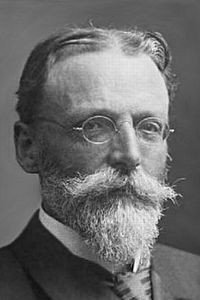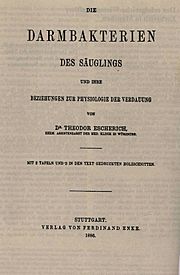Theodor Escherich facts for kids
Quick facts for kids
Theodor Escherich
|
|
|---|---|

Theodor Escherich, around 1900
|
|
| Born | 29 November 1857 Ansbach, Kingdom of Bavaria
|
| Died | 15 February 1911 (aged 53) |
| Nationality | German, Austrian |
| Citizenship |
|
| Alma mater |
|
| Known for | Discovery of Escherichia coli |
| Spouse(s) | Margaretha Pfaundler |
| Awards |
|
| Scientific career | |
| Fields | Medicine, pediatrics, bacteriology |
| Institutions |
|
| Doctoral advisor | Carl Jakob Adolf Christian Gerhardt |
| Signature | |
 |
|
Theodor Escherich (born November 29, 1857 – died February 15, 1911) was a famous German-Austrian doctor who specialized in treating children. He was a professor at universities in Graz and Vienna. He is best known for discovering and describing a very important bacterium called Escherichia coli, often shortened to E. coli.
Contents
Life and Achievements
Early Life and Schooling
Theodor Escherich was born in Ansbach, Germany. His father, Ferdinand Escherich, was a medical officer and statistician. Theodor's mother died when he was five years old. When he was 12, he went to a special boarding school run by Jesuits in Feldkirch, Austria.
After three years there, he finished his high school education in Würzburg, Germany. He passed his final exams, called the Abitur, in 1876.
Medical Training
After serving in the military for six months, Escherich began studying medicine at the University of Würzburg in 1876. He also attended universities in Kiel and Berlin. He returned to Würzburg and passed his medical examination with excellent results in December 1881.
Starting His Medical Career
After working in a military hospital in Munich for 18 months, Escherich returned to Würzburg in 1882. He became an assistant to a doctor named Carl Jakob Adolf Christian Gerhardt at the Julius Hospital. Gerhardt was his advisor for his medical doctorate.
On October 27, 1882, Escherich earned his medical doctorate degree. For the next two years, he studied in Vienna and did research on bacteriology (the study of bacteria) at the St Anna Children's Clinic. In 1884, he continued his research in Munich, where children's medicine was becoming a special field.
Later that year, he was sent to Naples, Italy, to study a cholera outbreak. He also traveled to Paris to learn from famous doctors there.
Discovery of Escherichia coli
In 1886, after a lot of research in the lab, Escherich published an important book. It was about how bacteria in the intestines (guts) affect how babies digest food. This book, titled Enterobacteria of infants and their relation to digestion physiology, made him a leading expert in the study of bacteria in children's medicine.
In this book, Escherich described a new bacterium. He called it "bacterium coli commune." Later, this bacterium was renamed Escherichia coli in his honor. It is now one of the most studied bacteria in the world. For the next four years, Escherich worked as a main assistant at the Von Haunersche Kinderklinik in Munich.
Professor of Pediatrics in Graz and Vienna
In 1890, Escherich became a professor of pediatrics (children's medicine) and the director of the St Anna children’s clinic in Graz, Austria. Four years later, he became a full professor. While in Graz, he married Margarethe Pfaundler. They had a son, Leopold, who sadly died at age ten, and a daughter, Charlotte.
Escherich made the children's hospital in Graz one of the most famous in Europe. In 1902, he moved to Vienna to become a full professor of pediatrics at the St. Anna Children's Hospital.
In 1903, Escherich became very well-known when he started the "Infant Defence Society." He led a big campaign to encourage breastfeeding for babies' health. He passed away in Vienna in 1911.
Honors and Awards
Theodor Escherich received many honors for his important work:
- 1894 — Became an honorary member of the Moscow Pediatric Society.
- 1905 — Became an honorary member of the American Pediatric Society.
- 1905 — Became a member of the Academy of Sciences in St. Louis, Missouri.
- 1906 — Was given the title of kaiserlich-königlicher Hofrat, which means Official Imperial and Royal Privy Councillor.
- 1906 — Became a member of the Medical Academy in Rome.
- 1909 — Became an honorary member of the Belgian Liga de la Protection de la Première Enfance (League for the Protection of Early Childhood).
See also
 In Spanish: Theodor Escherich para niños
In Spanish: Theodor Escherich para niños


